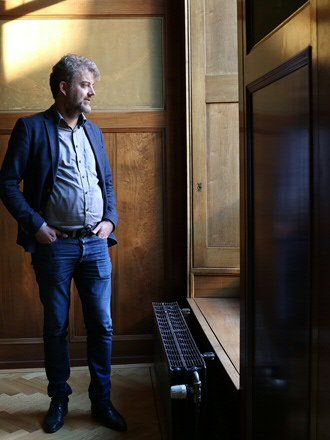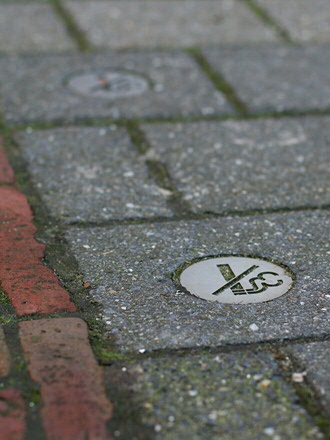Collisions on the social highway

Zwarte Piet (‘Black Pete’), the Oostvaardersplassen, gender issues... social discussions are flaming up everywhere, and every year, positions seem to harden. This is the research field of Frank Hindriks, Professor of Ethics, Social and Political Philosophy. ‘As a philosopher I try to sketch the bigger picture – you might say I study the traffic rules of society’. A philosopher as a social traffic controller – how does that work?
Text: Annemieke van der Kolk, UG Communication, photos: Hesterliena Wolthuis
“Dear passengers”
Looking at things from other people’s perspectives is a very good thing to do in an unjust world, Hindriks explains. ‘Often our politicians express their opinions immediately. But when I was young, I was taught to think before speaking. I sometimes wonder if a person is not talking too much in terms of their own identity, background or history.’ Hindriks also saw this in people’s reactions to the decision of the Nederlandse Spoorwegen (the main Dutch railway operator) to address passengers by saying ‘dear passengers’ instead of ‘ladies and gentlemen’. ‘Some people were annoyed by this and felt the majority was being made to suffer for the minority. But how can you feel disadvantaged by someone saying “dear passengers”? This is the kind of thing I think about. Are people afraid of losing something? I have the impression our society is becoming increasingly sensitive to change.’
Participation society
Hindriks specializes in social ontology ‘We examine social practices and organizations in a society and how people can participate in them.’ He illustrates this on the basis of the ‘participation society’ advocated by Prime Minister Mark Rutte – a society in which every citizen has a responsibility to take part. ‘This sounds very fair, but the fact is that not everyone can participate. What if you want to work, but can’t find a job? A citizen may have individual responsibility, but you also have responsibility in terms of society.’
Defending the indefensible
Hindriks observes that injustice in society is maintained when people start rationalizing – that is, using dubious logic to justify something, or to put it differently, defending the indefensible. ‘We are good at seeing our successes as deserved, without recognizing the role of our environment.’ He gives his own career as an example. Hindriks studied economics and philosophy. Although he thought philosophy was more interesting, he started his working life as an economist and worked in both the public and the private sector. There were plenty of permanent jobs available, but in 2001 he nevertheless opted for the insecurity of philosophy – a decision that turned out well. ‘If I were to rationalize, I would say I made the right choices in my life and that’s why I’ve landed on my feet. But I’ve also faced adversity and I’m aware that the coin could easily have fallen the other way.’
‘You just don’t run a red light’
At the same time, there is a lot that’s goes well in our society and Hindriks is by no means disillusioned about his search for the ideal society. He draws attention to the interplay of standards and sanctions in society. ‘Both are determining factors in our behaviour. Some people say that only sanctions determine our behaviour and keep us on track. My hypothesis is that you can also obey a rule because you think it’s a good idea and not because you’re afraid of a sanction. Here in Groningen people ride their bikes through red lights all the time and generally that’s not a problem. But fortunately it happens very rarely that someone drives a car through a red light. Although of course a road user’s risk analysis plays a role, it is also a question of people obeying a rule: you just don’t run a red light in your car.’

Rules can be counter-productive
‘Formal rules can even be counter-productive’, warns Hindriks. ‘Take those round silver tiles around the entrance of the Philosophy Building that mark where smoking is not permitted. Before those tiles were there, smokers had consideration for other people around them and passers-by. But now they stick to the boundaries indicated by the tiles, apparently they are much more of a nuisance than they used to be. This is a good example of a lack of trust in people’s capacity for self-regulation. Without sanctions, people keep their standards high.’ Hindriks’s research focuses on rational choice theory, a model for making choices. ‘I have tried to incorporate the importance of those standards into this framework.’ Hindriks’s eyes light up as he adds, ‘I think I’ve succeeded in doing that’.
Liberty, equality and responsibility
Hindriks’s contribution to a fairer world is not limited to his research. As director of the University of Groningen’s Centre for Philosophy, Politics and Economics, he tries to bring researchers and students from different disciplines together. ‘Our mission is to train people to have a broad social perspective. We conduct research into liberty, equality and responsibility. You can apply these themes to the participation society and democracy, for instance, but also to the energy market and to climate policy. Of course, this last issue – climate policy – will change enormously in the coming years. We are attracting a lot of attention with our research and a new Master’s degree programme and that is very energizing.’ There’s only one thing lacking: ‘I sometimes miss having a good philosophical conversation with a fellow philosopher. We don’t do that often enough.’
More news
-
08 December 2025
Citizen participation essential for a sustainable energy future
-
02 December 2025
Trust in science requires integrity in communication
-
28 October 2025
The search for responsibility in the financial world
